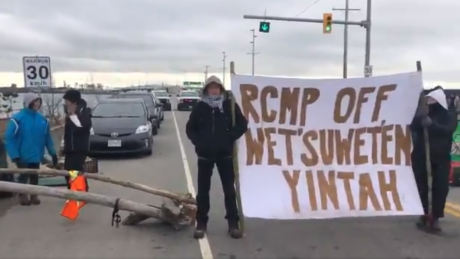Action Alert
You are here
All eyes on Wet'suwet'en

February 11, 2020
This article is a primer for activists looking for more information about the Wet'suwet'en struggle to defend their lands. Events are changing hourly. If you wish to see the latest updates, please see: https://unistoten.camp/
Please check out the Unist'ot'en Supporters toolkit at: https://unistoten.camp/supportertoolkit2020/
If you are able to donate to the cause, you can do so at: https://unistoten.camp/support-us/donate/
To see a list of events please click here: https://www.facebook.com/events/221856442184296/
It's been a very dramatic start to a new decade on Wet'suwet'en territory.
On New Year's Eve, the BC Supreme Court granted Coastal Gaslink (CGL) an injunction "giving them access" to Wet'suwet'en land to continue construction of the fracked gas pipeline from the BC interior to Kitimat on the coast. They have obtained approval from the band councils, whose leaders are chosen by democratic elections on the reserve. But the Wet'suwet'en Hereditary Chiefs maintain that this is their unceded territory, and the band councils have no authority over their land.
Title for the land was recognized as belonging to the Wet'suwet'en Hereditary Chiefs in the landmark 1997 Delgamuukw decision at the Supreme Court of Canada. The injunction has been granted as if this Constitutional question did not exist.
The Wet'suwet'en Hereditary Chiefs responded on January 4 by invoking their law on their unceded territory by evicting CGL employees from their land, and calling for provincial permits to be revoked and for nation to nation talks with the Prime Minister, the BC Premier and the commissioner of the RCMP.
All eyes on Wet'suwet'en
Immediately calls for solidarity actions went out across the country with rallies, marches and other actions happening in Smithers, Vancouver, Victoria, Calgary, Edmonton, Toronto, Montreal, Ottawa, Halifax and many smaller communities in the week of January 7 through 12. There were also actions in Seattle, San Francisco and even in Slovenia.
The struggle gained an international dimension on January 6 when the UN Committee on the Elimination of Racial Discrimination called for the halting of 3 BC projects, including CGL, because of the lack of "free, prior and informed consent" from the rightful holders of title. The hypocrisy of the BC government is staggering. Just months after passing new UNDRIP legislation, supposedly in the spirit of reconciliation, Horgan refuses to honour the rightful title holders under Canadian law with even an in person visit, much less actual nation-to-nation diplomacy.
The RCMP established a road block and "exclusion zone" on January 13 on the road to Unist'ot'en camp. Wet'suwet'en people were turned away from their own territory, media was blocked from access and lawyers not licensed in BC have been refused access, which has affected the Legal Observers group that was there to monitor the conflict. This is similar to the tactics the RCMP used before invading and arresting land defenders this time last year.
Police violence
Last year’s violent raid caught many outside Wet'suwet'en territory and particularly in non-Indigenous communities by surprise. This year many more people all over the world are paying attention, putting pressure on politicians and the police to respect the Hereditary Chiefs.
On January 14 the Union of BC Indian Chiefs (UBCIC), the BC Civil Liberties Association (BCCLA) and the BC Government and Service Employees' Union (BCGEU) along with a law professor from the UBC Allard School of Law held a press conference to decry the RCMP tactics and urging Wet'suwet'en territories and rights be respected. The BCCLA brought forward legal complaints against the RCMP blocking of Wet'suwet'en Clan members who were delivering food, medicine and warm clothing to their territories. All present urged that police violence not be used. Since then the UBCIC and the BCCLA have brought forward more first hand accounts of the improper and unlawful actions of the RCMP in implementing and enforcing the checkpoint and exclusion zone.
On January 20, Climate Justice Toronto occupied the office of the Deputy PM Christia Freeland, Extinction Rebellion led a protest that blocked the Swartz Bay Ferry Terminal and delayed ferries for over 2 hours. The next day, Indigenous youth occupied the office of BC Minister of Energy, Mines and Petroleum Resources and stayed overnight. The police arrested 11 Indigenous youth, after many non-Indigenous supporters had gone. The arrests took place with guns drawn, and the police violence caused damage to their personal belongings and regalia.
In a press conference after being released, 18 year old Ta'kaiya Blaney of the Tla A'min Nation in BC, spoke of the motivation for the protests: "When Canada tries to destroy our lands for profit, what they are trying to do is extinguish who we are, our spirits as Indigenous people and we cannot stand idly by." She called out the RCMP for their violence, but then called for Canadians to hold their police to account: "We are doing everything we can to protect your children. Everyday Indigenous youth get criminalized like this so your children can have a future: so what will you do?"
RCMP Invasion
In the weeks leading up the the raid, RCMP continued their harassment of Wet'suwet'en people, media and deliverers of food and other supplies to the Gidimt'en and Unist'ot'en camps. They also started amassing of large numbers of RCMP officers, vehicles and tactical equipment in local towns, even as meetings between the Wet'suwet'en Hereditary Chiefs and the BC Provincial liaison, Nathan Cullen, continued. While the province sought negotiations, the Wet'suwet'en Hereditary Chiefs stated as they have many times before that they will not allow pipelines on their unceded land.
In the early morning hours of Thursday February 6th, the RCMP moved in to break up the supporters camp at the 39 km mark on the road into Unist'ot'en. They arrested and handcuffed 6 Wet'suwet'en supporters there who were later released. There was an immediate response by Wet'suwet'en supporters across Turtle Island, including Indigenous Youth led occupations of the BC legislature, the ongoing shut down of ports in Vancouver and Delta, BC, and the shutting down of the Via Rail line in Belleville.
On Friday, the RCMP continued their assault on the Gidimt'en checkpoint at the 44 km mark on the road. They arrested four more land defenders there, but in the process of dismantling the gate they damaged the bridge, slowing further access down the road. Wet'suwet'en Hereditary Chiefs and their supporters at the 27 km mark on the road, briefly blocked the RCMP convoy from moving out of the territory. In retaliation, the RCMP has expanded the exclusion zone to include almost all Wet'suwet'en land.
More actions erupted across the country, including three separate actions in Toronto on Friday, followed by a 5 hour shutdown of the CP Rail line near the Junction on Saturday. Over 50 solidarity actions have happened across Turtle Island and around the world, over the past week and there will are more being planned everyday. The message from the front lines of the struggle is to Shut Canada Down.
Solidarity
The strong stand taken by the Wet'suwet'en people to defend their unceded land, and their raising of the call for Solidarity has been inspiring, as has the fact that people all over Turtle Island have responded to calls for solidarity.
This means we have to continue building Wet'suwet'en solidarity more broadly because a win for Wet'suwet'en self determination will give confidence to other Indigenous land defenders to resist these encroachments on their land, and inspire new layers of climate justice activists that there is hope.
We have to demand that the RCMP stand down, dismantle their road block and "exclusion zone" and leave Wet'suwet'en territory. BC Premier Horgan, Prime Minister Trudeau and the commissioner of the RCMP need to meet with the Wet'suwet'en Hereditary Chiefs as they have requested, for nation to nation discussions. No construction can happen without free, prior and informed consent by the Wet'suwet'en Hereditary Chiefs.
Union struggle and just transition
There have been statements of solidarity with the Wet'suwet'en Heriditary Chiefs and Clans from BCGEU, CUPE, IATSE and CUPW as well as nurses and teacher groups, and we should continue expanding these layers of support. But the power of the working class is on the picket line, and there is currently a militant struggle of Unifor Local 594 workers who have been locked out at the Co-op oil refinery in Regina to protect pensions they thought they'd won long ago. The lockout was imposed after union members had almost unanimously voted to strike.
Fossil fuel infrastructure and infrastructure development at the frontlines of these two struggles have been shut down, and they are both confronting corporations drive for profit that is poisoning Indigenous lands and driving down labour (and retirement) conditions. But there are divisions to be overcome: the refinery workers haven't framed their struggle in terms of climate demands or support for Indigenous sovereignty. Pensions for workers are not at the top of the priority list for Indigenous land defenders and those in the climate movement. But there are many in the labour movement who are scared and worried about the climate crisis and what it means for their children. Climate justice means fighting in unions for solidarity with the Wet'suwet'en people and other Indigenous land defenders: making solidarity statements, donating money for the front lines and publicizing the struggle and making the links to workers' struggles. It also means concretely building within the labour movement to support a just transition to a sustainable economy, which promises many more jobs than the oil business.
Shut Down Canada
On the night of Saturday February 8th, a small group of protesters blocked the access road to Deltaport, the largest container port in Canada with the plan of blocking the port until the RCMP get off Wet'suwet'en land. On Sunday morning, representatives of the International Longshore & Warehouse Union (ILWU) Local 502, representing workers at Deltaport approached the barricade with a message of solidarity and that they would not cross the picket line. The 300 workers who would normally work there stayed away and the port was shut down. This is a fantastic opening, and represents the kind of action that can win.
On Sunday, February 9th, the militarized RCMP detachment continued it's progress down to the Unist'ot'en camp. More solidarity actions are needed; more ports, rail lines, airports and other infrastructure need to be shut down; more occupations of politician's offices. And crucially, more solidarity from workers to support this important struggle for Indigenous Sovereignty and the future of the planet.
Go to unistoten.camp for all the details on how to support. Get your community group, union local, student union or congregation to draft a solidarity statement to post online and send to the front lines. Host a fundraiser, donate directly or buy merchandise. Look for local actions in solidarity.
No Access without Consent! RCMP Off Wet'suwet'en Land! Free the Political Prisoners arrested for defending THEIR UNCEDED LAND!
Section:










